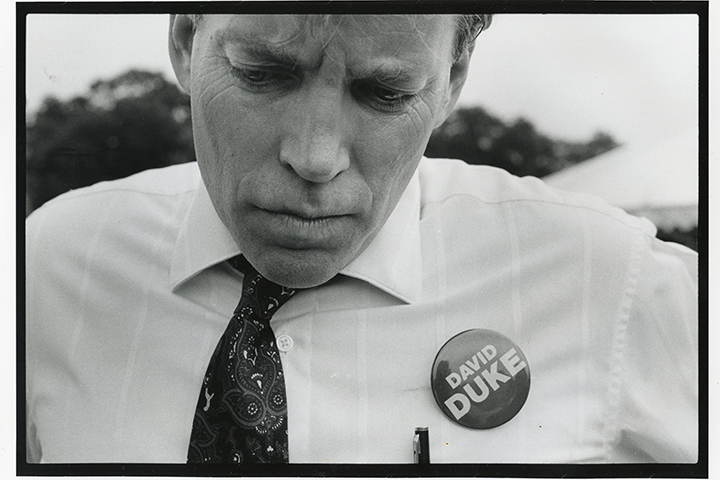Kevin MacDonald
Occidental Observer
January 5, 2015

The speech supposedly given by Rep. Steve Scalise to David Duke’s group is now a major national news story (see James Edwards’ article). One might think that this could be a teachable moment, but of course the mainstream media is doing everything it can to ensure that it is not. It’s just another opportunity to call Duke and anyone with similar views “White Supremacists” or “Neo-Nazis.” The Washington Post headline is typical: “House Majority Whip Scalise confirms he spoke to white supremacists in 2002.” The New York Times refers to Duke as “the former Klansman and white supremacist who two decades ago was almost elected Louisiana governor.” CNN labels him “a notorious white supremacist.” The video on the CNN page achieves the trifecta: “White supremacist,” “neo-Nazi,” and “former Ku Klux Klan leader” — as well as a statement from Jewish ethnonationalist and pro-Israel fanatic Charles Krauthammer saying that Scalise should resign from his leadership position. The Daily Caller which bills itself as a conservative site, also used the “white supremacist” label.
The “white supremacist” phrase is particularly galling. This is a very effective term of art invented by the left to pathologize any sense that White people have interests like everyone else. Israel is already a de facto Jewish state, but we never hear about Jewish supremacists in the Western media. No one labels Koreans as Korean supremacists if they oppose displacement-level immigration from Africa because they desire their country to remain Korean.
That the label is routinely used so effectively in the U.S. media is telling testimony to the power of the anti-White left.
White conservatives are terrified to be tarred with the label. As a result, policies that in fact would benefit Whites can never be advertised as such — so White politicians necessarily become adept at phrasing their implicitly White policies in terms of abstractions like “big government.” Indeed, the NYTimes article claims that in his 1991 run for governor, Duke avoided explicit talk about White racial interests. He “told voters he regretted being ‘too intolerant’ in his youth and said he would not disown his daughters if they brought home an African-American or Jewish boyfriend. Instead, he focused on anti-big government and anti-tax mantras that preceded the Tea Party movement.” He also advocated implicitly pro-White policies like forcing welfare recipients to take birth control. And after being elected to the state House of Representatives in 1989, Duke proposed “measures implementing stricter guidelines for residents of public housing, repealing affirmative action programs and eliminating minority set-asides” — policies obviously aimed at benefiting the White majority.
The fact is, however, that Duke’s political positions in the early 1990s are now part of the mainstream and reflect the steadily increasing racialization of American politics resulting from massive non-White immigration — exacerbated in Louisiana by the history of racial politics. As the NYTimes article notes,
in his 1991 campaign for governor against Edwin W. Edwards, Mr. Duke largely avoided explicitly racial campaigning, appealed to the frustrations and resentments of white voters and won more than 60 percent of the white vote while losing in a runoff election. Two decades later, much of his campaign has merged with the political mainstream here, and rather than a bad memory from the past, Mr. Duke remains a window into some of the murkier currents in the state’s politics where Republicans have sought and eventually won Mr. Duke’s voters, while turning their back on him.
Throughout the U.S., White people are increasingly voting on the basis of their racial identity rather than their social class, and this trend is even more pronounced in Louisiana than many other areas. The same NYTimes article quotes a Louisiana political analyst noting that in the recent senatorial election the Democrat candidate, Mary Landrieu, carried only 18 percent of the white vote, while the Republican candidate, Bill Cassidy, captured just 5 percent of the black vote. Obviously racial polarization in Louisiana has increased since the 1990s. A similar level of racial polarization throughout the country would result in total Republican domination.
But, more importantly, it also suggests that, at least in Louisiana, it would not fatally damage a White politician in a district with a clear White majority to make explicit appeals to White identity and White interests. Indeed, it may well be the case that an explicit appeal to White interests would be a good strategy in a primary election against another White Republican who spouted diversity mantras even while appealing to implicit Whiteness on policy issues. Indeed, the NYTimes article notes that Duke’s “decision to run to the right of the field is now a common maneuver in Louisiana’s open primary system.”
The 82-18 split among White voters is a clear indication that the great majority of Whites are voting on the basis of their racial identity, not their social class or other factors. With a divergence so great, the only Whites voting Democrat are deluded college professors and other readers of the New York Times, social misfits, and low-information Whites who continue to be captivated by media messages emanating from Hollywood.
I suggest it is very unlikely that the great majority of these Whites are going to be intimidated and guilt-tripped by the deluge of charges of “racism” and “White supremacism” that a campaign phrased in terms of explicit Whiteness would elicit from the mainstream media. Such people are simply not going to vote for the party of Al Sharpton, La Raza, and Elizabeth Warren.
Duke was clearly ahead of his times in promoting policies that appeal to the White majority of Louisiana, even though he got over 60% of the White vote in the 1991 election despite hostility from the Louisiana media, a deluge of out-of-state money to the opposition, and even threats that factories and jobs would leave Louisiana if he was elected.
It’s a different atmosphere now than in 1991. I suggest that it’s time for an explicit appeal to White interests in states and congressional districts with lopsided majorities of Whites voting Republican. Metapolitics is all well and good. But with such large White majorities, more direct options should be explored. The election of an explicitly White politician to statewide or federal office would be, to quote Ben Wattenberg out of context, “heartening news of an almost transcendental quality.”
And if the national Republican party blocks the nomination of explicitly pro-White candidates, it’s definitely time for a third party.

